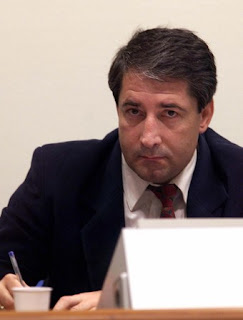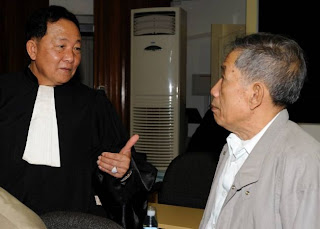Employee of the Month

“Can Duch still be useful to humanity?” inquires Francois Roux, Duch’s international lawyer in his final statement.
Duch’s intelligence and efficiency are known to those acquainted with him personally or through scholarly research. Many have pointed out that he has the efficiency of a dedicated teacher who never misses a spelling error in a student’s essay and who laboriously wades through student papers burning midnight oil until the job is done. Those who knew him as an educator have attested to this on numerous occasions. Those who knew him as an administrator working for an international NGO in the post-July 1997 camps did so too. One of Duch’s international managers in the camps pointed out to me that Duch was a godsend: he spoke a number of languages, was an efficient junior manager, and was respected across the board by the international and Cambodian colleagues. Respected, that is until they found out who he was during Democratic Kampuchea. Even after such a grisly discovery most would not withdraw their commendations of his ability as an NGO employee. During these proceedings an observer pointed out to me that Duch was once again demonstrating his efficiency as a manager and a highly skilled civil servant: he monitored the proceedings in all three languages and corrected the interpreters when he felt they erred, he quickly embraced the system of court documentation and adroitly used it in his defense, he listened closely to testimonies and gave detailed critique, he quoted his own statements in support of subsequent ones and at times took over the proceedings. At times his level of participation in the proceedings, his calmness and professionalism would make an observer feel as if Duch were not the accused but yet another expert witness who happens to be in court the entire time and who knows more about the subject-matter than anyone who takes the stand. Would all these skills be “useful to humanity” or more locally would these skills be of use to Cambodian society? I do not think there is any doubt they would be, particularly in the environment of a poignant dearth of quality human resources to staff the numerous NGOs, UN agencies and fledgling companies in Cambodia. Is this, however, the perennial question of proceedings based on charges of crimes against humanity?
The international lawyer for Civil Party Group (CPG) 1 posited to the Trial Chamber (TC) that in dealing with Duch they were not dealing with an Oscar Schindler type of individual (my curiosity as to how the said lawyer expected the Cambodian judges who doubtless have not seen the film to be able to appreciate this allusion notwithstanding). Duch, however, is not Dusko Tadic (known as ‘Dule’) either to whom the same counsel referred to as “a camp guard” but whose role was much more nuanced and flabbergasting than that. In fact, Dule started off his career by using his acquaintance with some of the guards of the camp in his town to sneak in after dark and beat and humiliate the detainees whom
 he considered to be his ethnic enemies and his inferiors.
he considered to be his ethnic enemies and his inferiors. Thirty years before Duch’s time as commandant of S-21 there was a European man who was of what was seen as good character, a family man, who was assigned a tough job of expanding and running a large facility which operated 24 hours which was a gigantic and at times unmanageable workload thrown at its small but dedicated staff. While supervising the construction of numero
A number, if not all, the Civil Party Groups (‘CPG’) to these proceedings have lamented the perceived lack of contrition and repentance on the part of Duch, although he showed emotion which was argued to be genuine by his counsel. The question of what is and what is not a genuine emotion when it comes to Duch was perhaps best floored by a psychologist who testified as an expert witness and who stated that Duch is very adaptable to his environments: communism was the soup of the day some thirty years ago and he ate that soup with vigor; Christianity is coming down the pike prominence in Cambodia today and he is on the bandwagon. The victims doubtless want him to feel something, to have regrets, and he tries to cater to his audience. Deep inside he feels that he has had many jobs to do in his lifetime and he feels that he has done them all well and to the highest standards of what was expected of him at the time. These proceedings is but yet another job he had to do and he tried to rise to the standards of what he thought was expected of him. Whether he fits one’s definition of a monster is a judgment call. What he is, however, is someone who finds ways to be enthusiastic about any job he is assigned, be it humanitarian relief or inhumane suffering.
To answer the question posited as thesis of this analysis, we will need to consider whether having a person in our midst who is adaptable to and excitable about missions to a point whether the nature of these missions becomes irrelevant is a benefit or a detriment to this society. Chandler, perhaps, said it best answering a very difficult question that he himself would not know what he would have done had he been presented with Duch’s choice. How many of us would give the same answer after a serious and honest introspection? The legal answer to the question is much simpler, however: regardless of Duch’s admirable traits of character, he furthered the commission of a crime and cannot be reintegrated into Cambodian society until after he has served the term of punishment which will soon be prescribed by the court. Whatever the gravity of this punishment might be, the court must be mindful that it cannot be more severe than that of Dule (20 years; subject to parole; released after 2/3 of term served) during which the court may consider Duch’s potential contribution to this society upon his release. In its analysis the court must go deeper than this and deeper than any other international criminal tribunal has gone thus far and analyze what an appropriate punishment of the US Supreme Court judges would be if a radically new government overturned Roe v Wade and would have calculated the number of fetuses which were terminated (read ‘killed’) pursuant to this law and would put the Roe majority in the dock; what would be an appropriate punishment to the members of the legislatures of the US states which practice the death penalty and which in the last thirty years have killed nearly 1,200 people; what would be an appropriate punishment to the sadists of Abu Ghraib if the US were not a superpower and if they were prosecuted by an international tribunal (as opposed to “they are still our boys and girls” judges of the US military tribunals and Obama’s most recent promise of no further prosecutions of persons “misled” by the interrogation techniques directive of the US Department of Justice (which leaves the question of who misled Gonzales). This court has a chance of reaffirming that justice is blind to the color of an accused’s passport and that if we cannot expect “our boys” to know that the pain amounts to torture if the detainee bellows in agony regardless of what the finer interpretation of the interrogation guidebook might be, nor can we apply a different standard to someone who happens to be a citizen of a small country with very little international clout and who happened to have worked for a government which has been condemned by the present powers that be. The court has a daunting task before it which it must approach gingerly and take its time analyzing the numerous facets this issue has.




